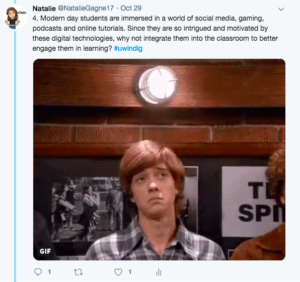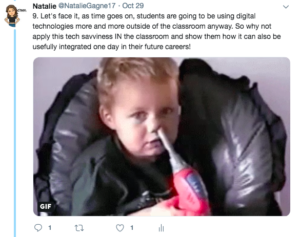Henry Jenkins and Michele Jacobsen raise interesting points about the integration of digital technology in the classroom. In his short video, Jacobsen explains that present day students are raised in a digital word and grow up on things like podcasts, video tutorials, gaming and social media and we are losing sight of the big picture when we consistently discourage them from using these modes of technology and networking in the school environment. Jacobsen also makes light of this in her article “Teaching in a Participatory Digital World’ and explains that teachers need to engage themselves more in the digital world to successfully integrate technology in the classroom in a way that engages and motivates students. I’ve attached links to Jenkin’s and Jacobsen’s content below.
.
.
Jacobsen Article:
https://www.edcan.ca/articles/teaching-in-a-participatory-digital-world/
.
I decided to write a Twitter essay to reflect on the ideas that Jenkins and Jacobsen raise. I’ve uploaded a link to my full twitter essay and a few snapshots of it below. Twitter is a platform that I passionately dislike and avoid using to express my own personal opinions, but I decided to give it a whirl to express myself in an academic context. In the end, I surprised myself and actually really enjoyed this reflection. Scrolling through the endless GIFs was addicting, and I found the poll feature to tweeting really useful. It seems like the platform has come a long way from when I can remember last using it years ago. The character count frustrated me while I was trying to get all of my thoughts on one idea into one tweet, but it forced me to be concise and to the point without sounding redundant and to keep my sentences short and sweet… unlike this one. 
.
Before reading Jacobsens article, I was always ‘pro-technology’ in terms of its integration into the classroom. Being a 90s baby, technology has been present in my everyday life since childhood and it doesn’t intimidate me. Jacobsen challenged me to think more critically about HOW I would actually integrate this digital world into my classroom one day. Looking back on when I was in high school, I can’t remember any teachers really encouraging the use of technology in our lessons, projects, homework, evaluations, etc. The times have changed dramatically in only a handful of years since when I was in high school, so I don’t have any previous personal experiences to build on or inspire me. Everything I’m learning about classroom technology is through my BEd, and I need to focus more on HOW I will actually make use of this digital world to benefit my students.
.
In regards to Jacobsens article, I whole heartedly agreed with most of what she had to say, but there was one idea that I struggled with. This was her idea that schools should remove their internet firewalls so that students can have access to the web without any boundaries. To some extent, I think this is a great idea and has good intentions, but I think that there will always be students who will abuse this privilege. I also think that some parents wouldn’t agree with this, namely those who apply firewalls to their internet at home to block their children from discovering sensitive content on the web. Then again, I think to myself: “Well, if these kids have cellphones and have access to the internet away from home or outside of school, they will find on their spare time whatever it is they want to find online.” I’m a strong believer in school being an environment greater than just one to host books and to teach students traditional academia. Students should be learning people skills, life skills, social interaction skills, learning about themselves, their strengths AND their weaknesses and how to embrace all of this in this crazy thing we call life. Learning experiences like getting in trouble for whatever ridiculous things students do help us grow and blossom into responsible and sensible adults. Sometimes getting in trouble is the BEST thing that can happen for a child, because in that moment, they are LEARNING. It’s cliché, but it’s true: we learn from our mistakes. Thus, maybe students should have the freedom to explore the internet freely while at school. If they’re going to do it on their own time anyway, why not let them explore what they want to explore in a safe environment under adult supervision and with guidance from teachers. If they push the limits of these privileges and abuse them, the privileges can be revoked and consequences can be enforced. Learning is occurring either way. Win Win for everyone.
.
Jenkins’ video and Jacobsen’s article really put things into context for me as a future teacher. It is our responsibility not only to include technology into our lessons, but to embrace that technology and engage ourselves in the digital world so that in turn, we can better engage students. If we aren’t motivated and passionate about what we are teaching, students won’t be either. This is partially why I chose to do a Twitter essay. I wanted to push myself into an uncomfortable environment and better familiarize myself with the platform that students regularly use. Teaching isn’t always comfortable, and learning often occurs at the boundaries of our comfort zone.
.
– Natalie Gagne
.
#uwindig
1. The classroom is an environment where the use of cell phones, social media and other web tools are typically frowned upon or feared. But instead of regarding them as distractions, could teachers do a better job of integrating technology into their lessons? #uwindig pic.twitter.com/xPBIBDYuXa
— Natalie (@NatalieGagne17) October 30, 2018


